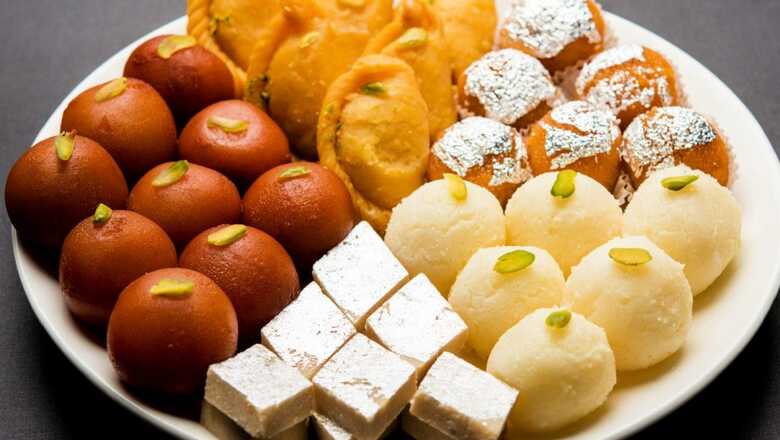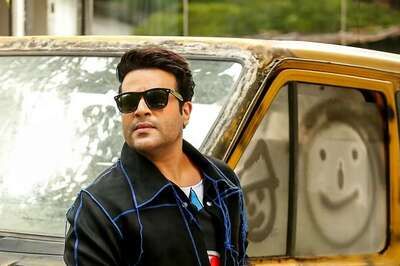
views
The festive season is and Navratri is just around the corner. Festive season also means that we are all going to have so much on our plate, quite literally! While enjoying a festival means more time with family, it also calls for celebration with food. From delicious sweets to decadent meals, festivities are incomplete without a lavish spread. So, what happens to your diet or planned meals during a festival? Well, fret not, experts suggest a healthy and smart way to stay fit this Navratri.
Making the right choice
Dr Rimmi Verma, Orthopaedic, Sujok Therapist and Diet Consultant, Axis Multispeciality Hospital, Mumbai, says, “Navratri calls for a celebration and that does not mean you should avoid your healthy diet routine. Be careful and do not overeat. It does not mean that you will skip your meals. Have your proper meal to maintain a proper diet. We often tend to pull ourselves back when it comes to sweets or sugar. You can have sweets during the festival as your diet is not affected by what you eat at festivals but what you eat throughout the year.”
Also Read: Navratri 2022: Bollywood-Inspired Makeup Tips That’ll Help You Look Fabulous This Festive Season
Rihana Qureshi, nutritionist and wellness expert, and founder of Get fit with Rihana (GFR), says, “Fresh (non-starchy) vegetables like tomato, cucumber, carrots, spinach and seasonal fruits such as watermelon, musk melon, papaya and apples should be the go-to foods. As far as possible avoid fruit juices, since that is too much (natural) sugar in one serving. Apart from this, have some form of dairy such as paneer, curd or buttermilk at least once in a day to meet your protein requirement since they have most amino acids. Instead of traditional rice and wheat, you can make your roti in rajgira flour and cook your khichadi or dhokla, with barnyard millet. You can consume all kind of dry fruits as well.”
If you are fasting then it is important to focus on foods that are nutritionally dense. Priya Palan, dietitian, Zen Multispeciality Hospital, says, “Add a variety of fresh fruits as they are loaded with fiber and antioxidants. Add nuts and dairy products to maintain protein intake in the diet. It is also important to hydrate well to maintain electrolyte balance.”
Ingredients that should make it to one’s diet this season
Dr Neha Chawla, nutrition and fitness coach, PFC (ProjectFitCo) – Transformational Fitness Organization, shares, “The fact that Navratri 2021 was spent at home due to Covid makes Navratri 2022 all the more special. Navratri fever will be upon us in a few days, and we will all be dressed in our finest attire.”
Here are some tips for managing the nutrition during Navratri:
Carbohydrates
Chawla suggests choosing slow digesting carbs that are high in fibre like whole grains, legumes etc. They keep us fuller for longer. She adds, “Add potato and sweet potato in the diet as they provide high satiety. They are rich in fibre, carbs, vitamins B6 and C . White potatoes are rich in vitamin C and potassium while sweet potatoes are rich in vitamin A and B5.
Proteins
Since there are a lot of variations and restrictions in fasting rules, people tend to miss out on protein content. Chawla shares, “Paneer, Curd/Greek Yoghurt should be included in all the major meals. Some people prefer to add soy chunks, tofu, whey protein to meet their protein requirements if their consumption is not forbidden in their culture.Go for unflavoured whey for this period. To achieve the daily protein needs, include multiple protein sources.”
Palan lists the following as essentials:
Nuts
Palan adds, “The “Chota Dhamaka” of food adds good micronutrients to the diet even if eaten in small portions. They are a good source of protein, healthy fats, fiber, and minerals.”
Makhana
It is a good food to be added to a healthy well-balanced diet. Palan shares, “It is an excellent source of nutrients i.e iron, calcium, fibre, protein, and magnesium, and adds a good satiety value to the diet.”
Sweet potato
The root vegetable is a good source of fibre potassium, and B vitamin and helps to prevent constipation. It also helps to promote regularity of bowel movements,
Myths around fasting
The biggest misconception about fasting is that it means eating less. Qureshi adds, “That is absolutely incorrect. Fasting only means controlling the food type and interval so that your body can repair, heal and detox. Also another myth is that fasting puts your body in starvation mode. Fasting when done right actually helps give your body the much needed break from continuously digesting food and helps it utilise its fat reserves effectively.”
Must-have recipes:
Protien Bhagar Pulav
Ingredients:
• 2 cups of overnight soaked bhagar.
• 100 gm malai paneer.
• 1 tbsp ghee
• Cumin Seeds (Jeera)
• Onion
• Tomatoes
• Carrots
• Cauliflower
• Peas
• Green chillies
• Garam masala powder
• Salt (to taste)
Recipe:
Buckwheat Dhokla
Ingredients:
• 120 g Kuttu ka Atta / Buckwheat flour
• 60 g sour curd
• 1 /4 tsp Ginger paste
• Salt to taste
• 1 tbsp Fresh coriander (grated)
• 1 tsp Green chilli (chopped)
Method:
- Clean and wash the buckwheat in enough water only once.
- Then drain the excess water using a strainer.
- Mix the buckwheat, sour curd and half a cup of water in a bowl.
- Cover it and soak it for at least 4 to 5 hours.
- Now, add green chilli, ginger paste and salt to the batter and mix very well. Pour the batter into a greased thali and spread evenly by rotating the thali clockwise.
- Also, Sprinkle freshly chopped coriander. Steam in a steamer for 10-12 min. Or till the dhoklas are cooked Cool slightly, cut into pieces and serve immediately with green chutney.– By Dr Neha Chawla, nutrition and fitness Coach, PFC (ProjectFitCo) – Transformational Fitness Organisation
Read all the Latest Lifestyle News and Breaking News here




















Comments
0 comment